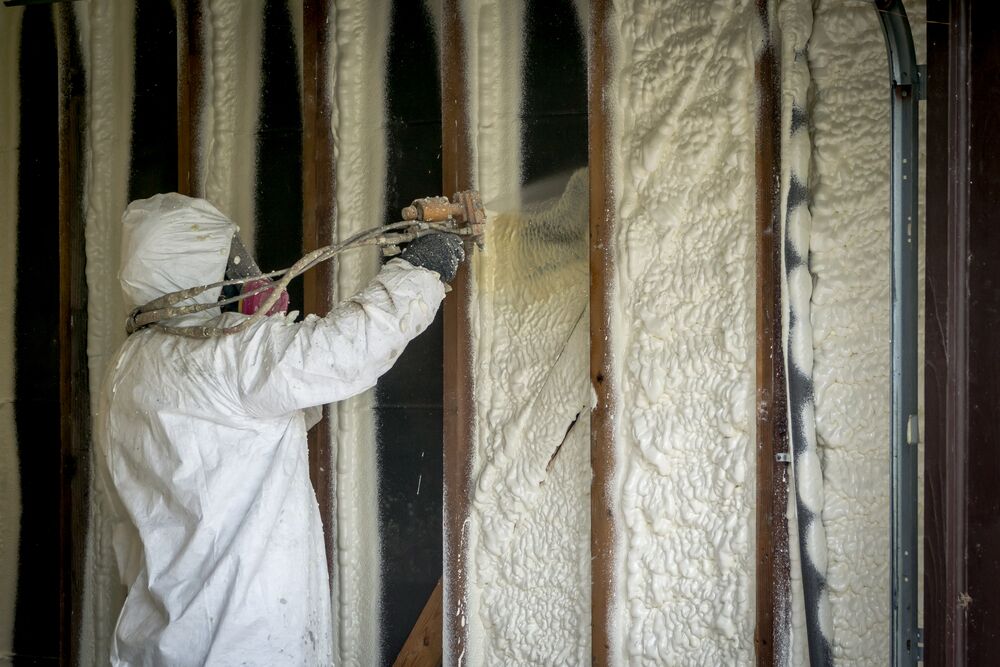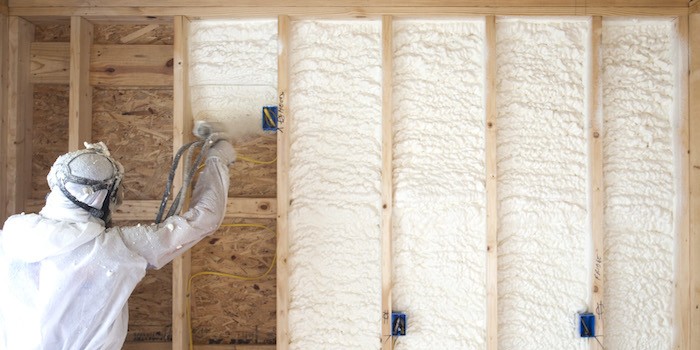How Spray Foam Can Improve Energy Efficiency in Your Home
How Spray Foam Can Improve Energy Efficiency in Your Home
Blog Article
Spray Foam: The Ultimate Solution for Air Sealing and Insulation
Spray foam insulation has actually arised as a leading option for efficient air securing and thermal insulation, using an unique combination of residential properties that establish it apart from typical techniques. Comprehending the complete scope of its benefits, setup processes, and comparisons with various other insulation kinds is vital for making notified choices.
What Is Spray Foam?
Spray foam is a functional insulation product that incorporates the principles of air sealing and thermal resistance to enhance power performance in structures. Composed mostly of polyurethane or various other similar substances, spray foam is applied as a liquid that increases upon call with surfaces, producing a solid, continuous layer of insulation. This special residential or commercial property allows it to fill spaces, splits, and voids that typical insulation products may ignore, offering a premium air seal.
There are two major kinds of spray foam: open-cell and closed-cell. Open-cell spray foam is lighter and more versatile, providing excellent noise absorption and a lower R-value per inch - Spray Foam. On the other hand, closed-cell spray foam is denser, providing a higher R-value, wetness resistance, and included structural honesty to building parts
The application process typically includes customized devices, ensuring a seamless application that abides by different substratums, including wood, concrete, and steel. This flexibility makes spray foam suitable for both brand-new buildings and retrofitting existing structures. Its capacity to produce an airtight obstacle considerably contributes to reducing energy intake and enhancing interior air high quality, thereby making it a preferred selection amongst homeowners and building contractors alike.
Benefits of Spray Foam Insulation
One of one of the most significant benefits of spray foam insulation is its extraordinary capacity to create a continuous air barrier, which properly minimizes power loss. Unlike traditional insulation products, spray foam increases to load splits and spaces, making certain that air leak is significantly decreased. This characteristic not only boosts energy effectiveness however also results in lower utility costs with time.
In addition, spray foam insulation gives remarkable thermal resistance, adding to a much more stable indoor setting. Its high R-value per inch permits for efficient insulation in restricted spaces, making it perfect for attics, wall surfaces, and crawl rooms. The moisture-resistant residential or commercial properties of spray foam assistance protect against mold and mildew and mildew growth, promoting healthier living problems.
An additional important benefit of spray foam insulation is its sound-dampening qualities (Spray Foam). It properly decreases sound transmission in between spaces, developing a quieter and a lot more comfortable home setting. The durability of spray foam additionally stands apart, as it does not droop or work out with time, preserving its efficiency throughout its lifespan
Exactly How Spray Foam Works
Comprehending how spray foam insulation works is essential for appreciating its performance in air sealing and thermal resistance. Spray foam insulation contains 2 main parts: isocyanate and polyol resin. When these elements are combined, they undergo a chemical response that creates the material to increase rapidly, producing a thick foam that fills spaces, cracks, and dental caries.
As the foam increases, it adheres to surfaces, developing a closed seal that significantly decreases air seepage. This particular makes spray foam insulation very effective at stopping drafts and dampness penetration, which can lead to energy loss and damage in time. Furthermore, the closed-cell variation of spray foam supplies superior thermal resistance due to its rigid structure, efficiently reducing warm transfer.
The special residential properties of spray foam enable it to satisfy irregular surfaces, guaranteeing detailed insurance coverage and a seamless barrier. Because of this, spray foam insulation not only improves power performance but great post to read also contributes to enhanced interior air high quality by lowering the buildup of toxins and irritants. Eventually, comprehending the mechanics behind spray foam underscores its duty as a superior choice for insulation and air securing in both household and industrial applications.
Installment Refine Overview

Before setup, the room must be sufficiently cleansed and prepped, ensuring that surfaces are without dirt, debris, and wetness. Because impurities can compromise bond and total efficiency, this step is important. As soon as the area is prepared, the application entails mixing the 2 components of the spray foam, which broadens upon get in touch with and fills up gaps efficiently.
Trained experts need to conduct the Check Out Your URL setup, using specific devices to make certain uniform coverage and optimal thickness. Security preventative measures, consisting of putting on protective gear and guaranteeing proper ventilation, are necessary throughout this procedure. After application, the foam commonly treatments promptly, creating a strong obstacle that improves energy effectiveness.
Comparing Spray Foam to Traditional Insulation
When assessing insulation choices, spray foam insulation sticks out in comparison to standard materials such as fiberglass and cellulose. One of the key benefits of spray foam is its remarkable air sealing capabilities. Unlike fiberglass and cellulose, which can allow air seepage, spray foam increases upon application, filling up spaces and crevices to develop a closed seal. This leads to improved energy efficiency, as much less warmed or cooled down air escapes the home, leading to lower energy expenses.
Furthermore, spray foam provides a greater R-value per inch than traditional insulation kinds, providing even more effective thermal resistance in a thinner profile. This particular is especially beneficial in rooms with limited tooth cavity deepness. Additionally, spray foam is immune to moisture and mold development, which can be a significant worry about cellulose and fiberglass, particularly in damp settings.
Nevertheless, spray foam insulation typically brings a greater ahead of time cost than its standard equivalents. Property owners have to weigh this preliminary financial investment against lasting energy cost savings and efficiency advantages. Ultimately, while both insulation kinds serve their function, spray foam arises as a more innovative solution for contemporary insulation requirements, specifically in regards to air sealing and thermal check this effectiveness.

Final Thought
In recap, spray foam insulation represents a highly efficient option for attaining optimum air securing and thermal resistance. Its one-of-a-kind homes, consisting of wetness resistance and audio dampening, make it ideal for numerous applications in both brand-new constructions and retrofitting projects (Spray Foam). The first prices may be higher contrasted to conventional insulation materials, the lasting benefits, such as significant power cost savings and improved interior air quality, warrant the financial investment and underscore its worth in contemporary building techniques.
Spray foam insulation has arised as a leading option for efficient air securing and thermal insulation, using a distinct combination of residential or commercial properties that set it apart from conventional methods.Spray foam is a functional insulation product that integrates the concepts of air sealing and thermal resistance to enhance power effectiveness in structures.When assessing insulation options, spray foam insulation stands out in comparison to typical products such as fiberglass and cellulose. Ultimately, while both insulation types offer their purpose, spray foam emerges as a much more innovative solution for contemporary insulation needs, especially in terms of air securing and thermal efficiency.
In summary, spray foam insulation stands for a highly efficient option for achieving optimal air securing and thermal resistance.
Report this page